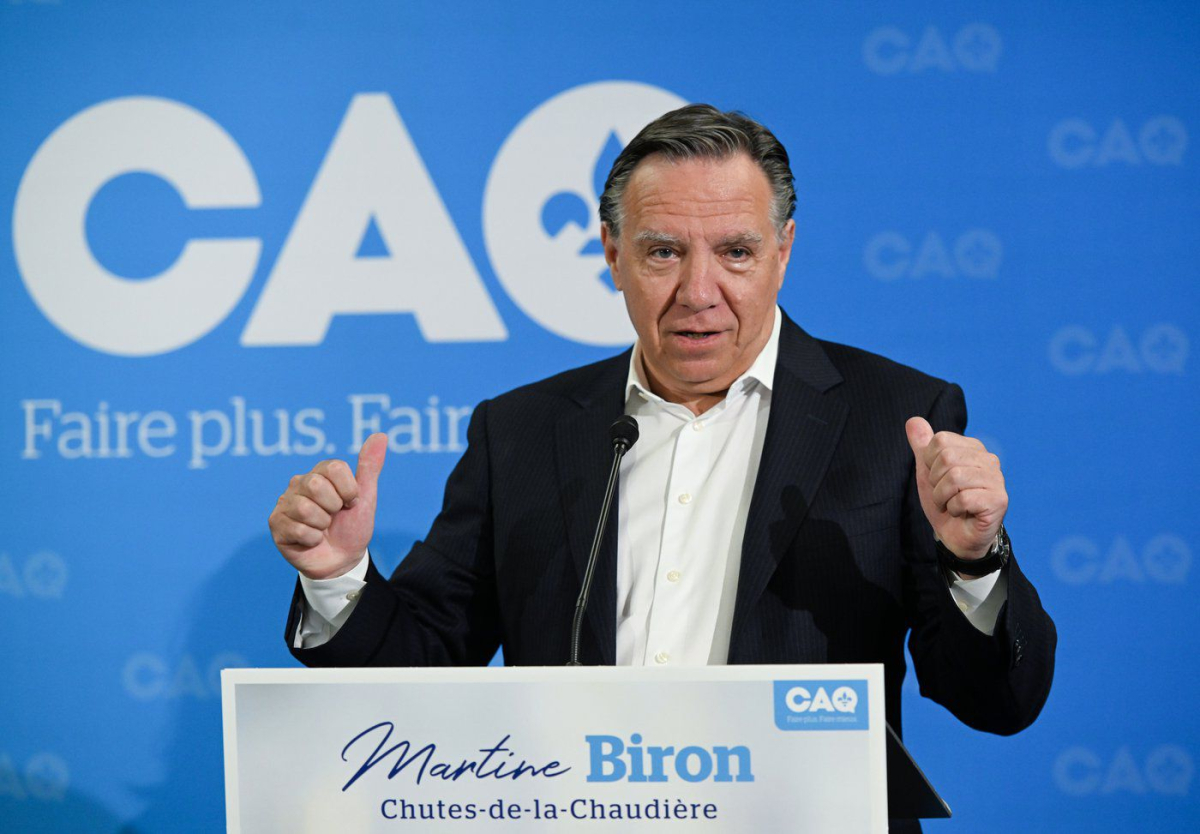François Legault’s win in the 2018 provincial election marked the start of a new era in Quebec politics, after nearly 50 years of federalist-versus-separatist two-party rule.
Four years later, Legault and his Coalition Avenir Québec are firmly in control, with polls suggesting he'll cruise to a second majority victory on Oct. 3.
Experts offer a number of reasons to explain Legault’s runaway lead, including his popularity among francophones, the fragmentation of the opposition and the sustained visibility he obtained during the COVID-19 pandemic.
Most polls show Legault with support in the mid-40 per cent range — more than double that of his closest adversary, the Liberals. Days ahead of Sunday's campaign launch, poll-aggregator website QC125.com pegged the probability of Legault’s party winning a majority government at more than 99 per cent.
Valérie-Anne Mahéo, an assistant professor of political science at Université Laval, said the election comes after more than two years of a pandemic during which Legault was “omnipresent.”
“He was there every day giving news conferences; we saw him all the time, and he governed by decree because of the health emergency,” she said in a recent phone interview. Opposition parties — most of which had new leaders — struggled for visibility because debate in the legislature on most issues regarding the pandemic was suspended, she added.
But Legault’s rise and continued strength cannot be solely attributed to circumstance, she said.
The outgoing Quebec premier, Mahéo said, has been able to capitalize on a new political landscape that began shifting even before his party was formed in 2011. For nearly 50 years, Quebec politics was defined by two competing visions: sovereignty, helmed by the Parti Québécois, and federalism, championed by the Liberal Party of Quebec.
But as interest in sovereignty has waned, a more traditional right-left political divide has emerged. That shift, she said, has led to the traditional parties losing ground in favour of the centre-right CAQ and — to a lesser degree — left-leaning Québec solidaire.
Legault's nationalist approach, which consists of asserting Quebec’s political sovereignty while ruling out an independence referendum, appears to have won over a large chunk of the traditional Parti Québécois base, Mahéo said. The CAQ has also successfully unseated the Liberals as the party seen as the strongest manager of the economy, she said.
As a result, the Liberals and PQ are struggling to redefine themselves under the new leadership of Dominique Anglade and Paul St-Pierre Plamondon, respectively.
“Legault was very skilled because he managed to short-circuit this debate between sovereignty and federalism,” Mahéo said. “He said, ‘I’m not concerned with that, I’m going to defend the interests of Quebec, no matter what the form.'”
Daniel Béland, director of the McGill Institute for the Study of Canada, says Legault stands to benefit from a fragmented political landscape that has four opposition parties polling between 10 and 20 per cent. Most opposition parties, he said, appear to be in “defensive mode,” including a Liberal party that is facing backlash from its traditional anglophone base over a perceived failure to defend the community against Bill 96, Quebec's language law reform.
The Conservative Party of Quebec, which has emerged from obscurity under the leadership of former radio personality Éric Duhaime, appears to be the only opposition party on the rise, Béland said. But it’s unclear, he added, whether the Conservatives' new-found support around the Quebec City area will translate into seats.
Béland noted that while Legault’s approval ratings may have dipped from the height of the pandemic, the premier remains relatively unscathed by controversies — including the deaths of thousands of long-term care residents during the first wave of the pandemic, the adoption of the language reform, and the passing of Bill 21, which bans some civil servants from wearing religious symbols to work.
Those two laws pre-emptively invoke the notwithstanding clause of the Canadian Charter of Rights and Freedoms to shield them from legal challenges, leading critics to accuse Legault of trampling linguistic and religious minority rights.
The key to Legault's resilience, Béland said, lies in his strong support among his mostly rural francophone base — and also within his own caucus. The opposition to the language and secularism laws, Béland noted, is concentrated in Montreal, where the CAQ won only two seats in 2018 and where the party doesn’t need to win on Oct. 3 to secure a second majority.
Legault's unquestioned leadership in his own party, Béland said, allowed him to get away with flip-flopping at times, including cancelling a short-lived plan to tax people who remained unvaccinated against COVID-19.
"He has some wiggle room to change course when necessary, when he sees that there is a backlash happening,” he said.
Both Béland and Mahéo said that while Legault is in a strong position ahead of the vote, he has his weaknesses.
Béland says that a new wave of the pandemic or worsening inflation could put pressure on the CAQ leader. As well, none of the opposition party leaders have participated in a leaders debate before, meaning one of them could emerge as a star and capture Quebecers' support on either issue, he said.
Mahéo said Legault during the campaign will face tough questions on immigration and on the environment. The party, she said, isn’t seen as an environmental leader and has been reluctant to raise immigration targets despite persistent labour shortages.
There’s also the possibility of a major stumble, although Mahéo notes that Legault’s strong lead makes that seem less likely.
“He’s so sure of winning that he can practically let himself get away with making half promises and not get too involved in the discussions in the debates,” Maheo said.
As the legislature broke for the summer, Legault's party had 76 seats, while the Quebec Liberals had 27, Québec solidaire had 10 and the Parti Québécois had seven. The Conservative Party of Quebec held one seat and there were four Independents.
This report by The Canadian Press was first published Aug. 26, 2022.




Comments